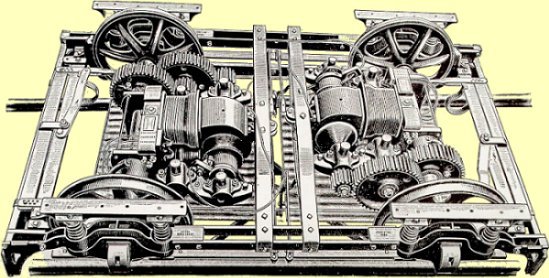The Fireside University
Today, a fireside university. The University of Houston's College of Engineering presents this series about the machines that make our civilization run, and the people whose ingenuity created them.
I do love these old books on technology and science. Here's a beautiful thick volume called The Fireside University of Modern Invention -- written by popular writer John McGovern in 1898. Like so many such books, it's done in question-and-answer form.
Many of these books were excellent, but this was not. As McGovern floundered in the sea of fast-breaking new knowledge, he revealed the danger that threatens any popular science-writing.
He begins with electricity. First question in the book, "What is electricity?" His hopeless reply: "It is believed to be one of the many demonstrations of what may plainly be called physical force." He muddles along in this vein and finally asks what electricity is good for. When electricity eventually reduces hard labor to near zero, he says, the mental progress of all people will be greatly enhanced. You decide how many points to award him on that one. It might depend on what you mean by mental progress.
He asks whether the units of ohms, amperes, volts, joules, or watts can be defined in common language. Since he himself cannot do so, he simply grumbles that they cannot be defined.
But he's curiously undaunted. At length he asks. "What three cardinal things may be named in the Universe?" His answer, "Motion, Matter and Life." Then he asks, "Wherein does Life differ from Motion?" His answer is priceless: "Life is a Motion that is eccentric, jerky or suspended. It has no regularity or period."
While he generally fans the air with the big questions, he does tell us much about the coffee trade, cheese-making, producer gas, power looms. Yet he seems unable to resist posing questions before which he is quite powerless. Science was opening up before us in 1898, and McGovern was drawn in -- craving to explain it while utterly without the tools needed to do so.
About the time he's being beaten down by the periodic table, he suddenly lurches to ask, "What may be said of Tin Cans?" His answer: "They are the most numerous, best and cheapest utensils man has ever made, but their use is accompanied with the most astonishing waste [since] they must be cut open in order to empty them."
Three years later Planck created quantum mechanics. Four more, and Einstein gave us special relativity. New McGoverns have emerged in every generation, with tongue-tied texts trying to tell us what it's all about, and each is soon forgotten. But this beautiful volume remains, with its steel engravings and McGovern's uncomprehending ambition to teach what he does not fathom.
The direct road to understanding science is also the most exciting. It is the patient process of studying science -- wonderfully rewarding and soul-settling. The huge failing of this book, like so many before and since, is that it presumes that process to be too hard -- a labor to be dodged. It is not. Try it yourself. Learn the math, pursue the process. And then, you'll see.
I'm John Lienhard, at the University of Houston, where we're interested in the way inventive minds work.
(Theme music)
J. McGovern, The Fireside University of Modern Invention, Discovery, Industry and Art. Chicago: Union Publishing House, 1898, 1900, 1902.

McGovern's book is filled with detailed images such as this one, which shows the chassis-mounted electric motor that drives a trolley car.